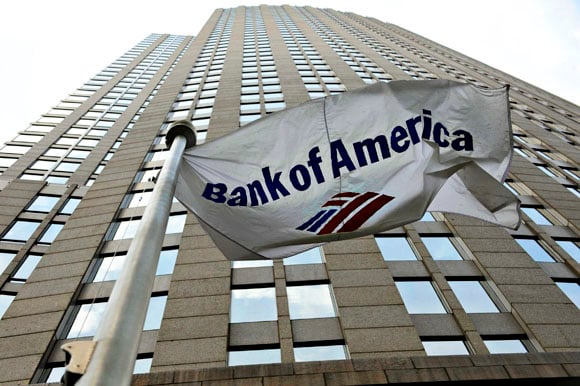A former Bank of America executive was indicted for allegedly participating in what prosecutors said was a “far-reaching conspiracy” to defraud municipal bond investments through bid rigging
A former Bank of America Corp. executive was indicted for allegedly participating in what prosecutors said was a “far-reaching conspiracy” to defraud municipal bond investments through bid rigging.
Phillip D. Murphy, former head of Bank of America's municipal derivatives desk, was charged with conspiracy to defraud the U.S., wire fraud and conspiracy to make false entries in bank records, according to the indictment filed yesterday in federal court in Charlotte, N.C.
Murphy “allegedly participated in a complex fraud scheme and conspiracies to manipulate what was supposed to be a competitive process,” Scott D. Hammond, a deputy assistant attorney general in the Justice Department's Antitrust Division, said in an e-mailed statement. “The division recently convicted at trial several individuals in this investigation, which is ongoing.”
So far, 13 individuals from banks including Bank of America, JPMorgan Chase & Co. and UBS AG have pleaded guilty in the Justice Department's investigation. Bank of America, JPMorgan, UBS, Wells Fargo & Co. and General Electric Co. have paid more than $700 million in restitution and penalties.
Four Years
Bank of America, which self-reported the illegal activity, has been cooperating for more than four years with Justice Department prosecutors who say that bankers paid kickbacks to CDR Financial Products to rig bids on investment contracts sold to local governments. Municipalities bought the contracts with money raised through bond sales, which allowed them to earn a return until the funds were needed for schools, roads, and other public works.
From 1998 until 2006, Murphy allegedly conspired with CDR Financial Products to increase the number of and profitability of investment agreements and municipal finance contracts that went to the bank, according to the indictment. Murphy won auctions for the investment contracts after other banks submitted intentionally losing bids, the government said.
The wire fraud charge has a maximum penalty of 30 years in prison while the conspiracy charges have a maximum penalty of five years in prison. The court today issued a summons to Murphy ordering him to make his initial appearance in the case on Aug. 20.
Susan Necheles, Murphy's lawyer, didn't immediately respond to a telephone message seeking comment on the indictment. Bill Halldin, a spokesman for Charlotte-based Bank of America, declined to comment on the charges.
Favored Bankers
Prosecutors say that favored bankers received inside information from brokers who handled the bidding so they could carve up the market. Kickbacks were disguised as fees on derivative transactions.
Prosecutors say the bid-rigging cheated taxpayers from California to Pennsylvania because bond money was invested at below-market rates.
In May, three former General Electric bankers, Dominic Carollo, Steven Goldberg and Peter Grimm, were found guilty by a federal jury in Manhattan of conspiring to rig bids for municipal bond investment contracts.
Peter Ghavami, the former co-head of UBS's municipal derivatives group, and two other former UBS employees are scheduled to be tried July 30 on bid-rigging charges.
2002 E-Mail
On June 28, 2002, Douglas Campbell, a former municipal derivatives salesman at Bank of America, wrote in an e-mail to Murphy, that he had paid $182,393 to banks and brokers not tied to any particular deals. Three payments totaling $57,393 went to CDR, which played no role in any transaction connected to that amount. A copy of the e-mail was contained in a North Carolina lawsuit filed by Murphy against Bank of America in 2003.
“The CDR fees have been part of the ongoing attempt to develop a better relationship with our major brokers,” Campbell wrote. He pleaded guilty to fraud and conspiracy in September 2010.
Six former employees of CDR, including its founder and former chief executive officer David Rubin have pleaded guilty in the Justice Department's investigation. The government said that CDR received as much as $475,000 in kickbacks for rigging bids.
--Bloomberg News--







